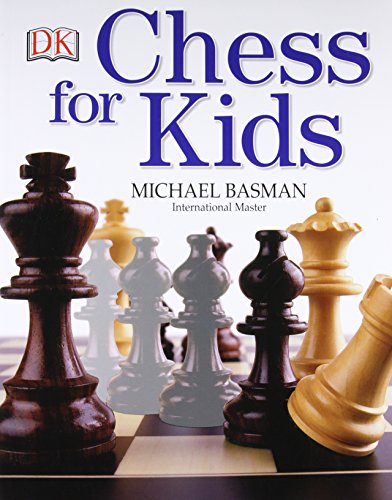Chess for Kids *Kindle
Master one of the world’s most fascinating games — chess! Learn how to play chess through this fun, illustrated chess guide! A board game like no other, chess challenges young minds to think strategically about moves by applying the principles of chess to their club games, tournaments and championships. Take your skills even further by gaining a deeper appreciation for the aim of the game and tactics. The chess book for kids age 9 and older includes: • Chessboard graphics that show how to apply the principles you learn in real-life game situations • A breakdown of the value, importance and role of each piece • A history section provides background on the game and its origins, reflecting the latest changes in the game and how it’s played International chess master and tutor Michael Basman show you everything you need to know to improve your tactics and win more games. Go from beginner chess player to chess champion by following the expert advice in Chess for Kids. Soon you’ll know the difference between chess pieces (your bishop from your knight!) and how to use them strategically, when to use the castling move and how to counter the Queen’s Gambit. Dive into the history of chess and learn from the greatest players and games. Before explaining techniques, the book builds your fundamental knowledge of chess and boosts your understanding of its value, power and importance. Chessboard graphics illustrate different scenarios so you can visualize different chess moves and their potential outcomes and learn the best move to make in any given situation. Read more
Download Now

Why Must Read Chess for Kids?
This book provides excellent, clear instructions for how to play chess. It includes very helpful graphics, as well. I also like that it presents some strategies that will be very helpful to novice players. My only gripe is that it continually describes the game in terms of war, war, and war. I know that the game play is a metaphor for war. Of course, this should be mentioned in the text. This book, however, seems to obsess with this. Especially in a book that presents itself as a guide for children, I feel it is inappropriate and distasteful to continually speak of "your army," "the battlefield," "control the events of the battle," "the opposing armies," "better than any army general," "The two armies move toward each other and then the fight begins," "Battle it out!" "as though the players are real generals overseeing a real battle," etc. Do we really want our children to feel like they are engaging in war, for fun? Chess is a wonderful game, despite its origin as a metaphor for war, not because of it. The author writes, "There is no feeling more satisfying than beating an able opponent." Really?
Read Now